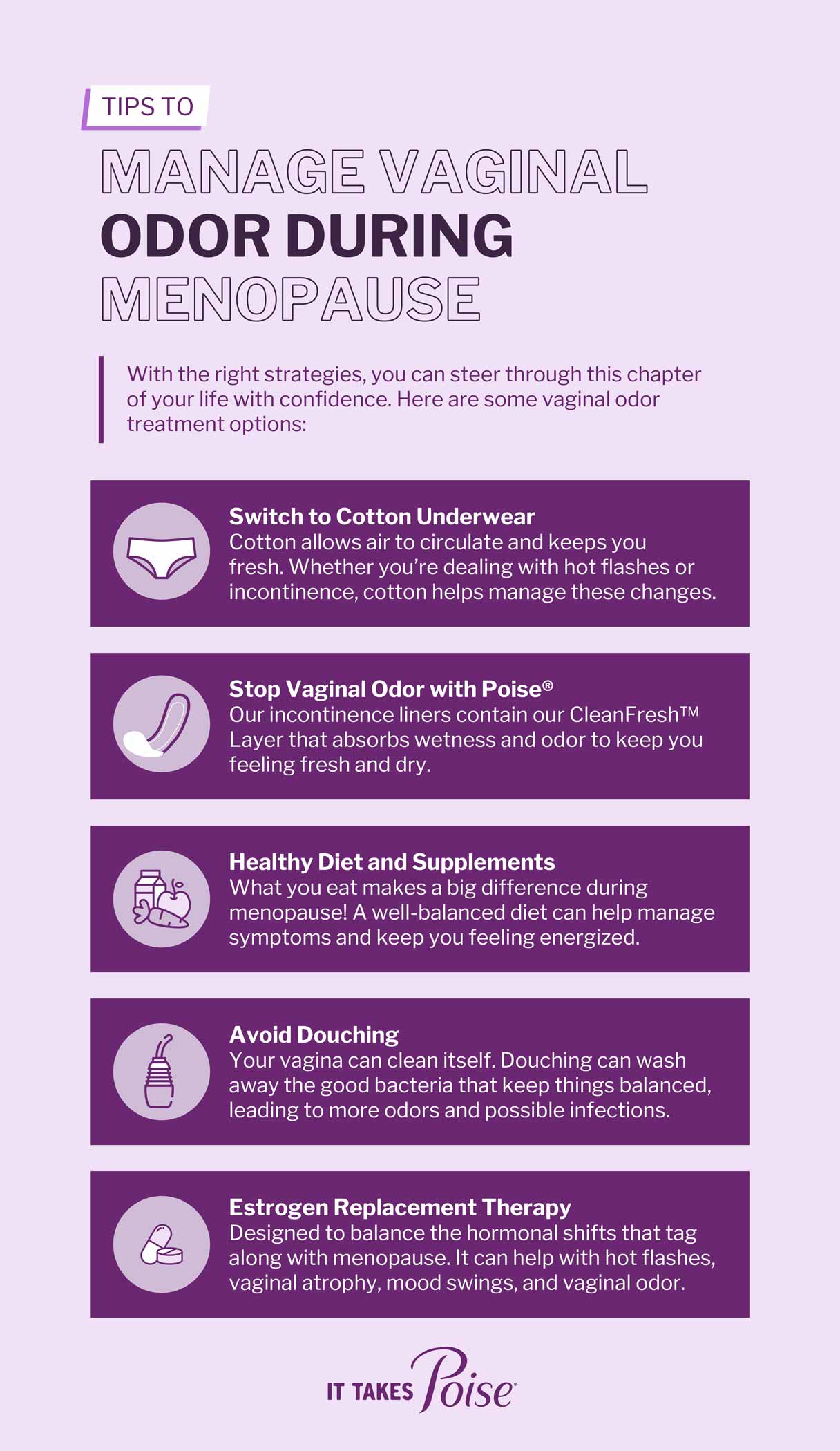Vaginal Odor and Menopause: What’s Happening as Your Body Changes?
Menopause is a natural and normal experience for women, but it can bring on a host of new changes to the body such as mood swings, hot flashes, and vaginal odor.
A common experience, vaginal odor during menopause can change how your vaginal odor smells as your hormones shift. Below, we’re sharing more about this common change related to menopause and vaginal odor and what you can do about it.
Why Does My Vagina Get an Odor After Menopause?
Your hormones are on a rollercoaster ride, and this can cause all kinds of unexpected changes to the body. When estrogen levels drop, this can lead to changes in your vaginal area.
These changes can also lead to alterations in how your vaginal area smells. With reduced estrogen, your vaginal walls start to slowly thin out and become drier – a condition known as vaginal atrophy. With increased vaginal dryness after menopause comes increased irritation and discomfort! This means that you can also get infections or imbalances that could change how you smell.
Something else to consider is a change in the delicate pH balance, which helps control which types of bacteria and yeast thrive there. When your estrogen levels fall, your pH balance can shift to become less acidic, which may bring about a different odor. Remember, there are different vaginal odors, and not all of them are bad. You want to aim for the sweet scent down there!
It’s perfectly natural to be thrown off by this new experience. Our bodies have their own way of communicating, and sometimes that means you’ll notice something you didn’t before. That’s especially true if it’s an uncomfortable circumstance like female odor after menopause.
Symptoms of Vaginal Odor: What to Look For
While changes in your vaginal odor are normal, it’s important to distinguish between everyday changes and something that might need a closer look.
| Symptom | What to Look For | Example | Why It Matters |
|---|---|---|---|
| Unusal Odar Intensity Without a Clear Cause | A big change in the strength of the odor for no apparent reason. |
|
A more intense odor can signal hormonal changes affecting pH balance. |
| Noticeable Change in type of Odor | A shift in the vaginal scent you're experiencing. |
|
Changes in odor type might indicate bacterial imbalance or pH shifts. |
| Persistent Odor Despite Good Hygiene | Odor that remains even with regular washing and personal care. |
|
Lasting odor could mean that meanopause- related changes are affecting vaginal health. |
| Vaginal Dryness | Smells that come with dryness or discomport. |
|
Vaginal atrophy can lead to odor changes and irritation. |
| More Urinary Tract Infections(UTIs) | Discomfort and strong smell when urinating. |
|
UTIs may indicate the thinning of the urethral tissue. |
Incontinence and Vaginal Odor During Menopause
Laughing at a joke? Sneezing from a cold? Or just walking briskly and realize you’ve peed your pants? An everyday occurrence like incontinence may also lead to new scents in the body.
You may be wondering: how are incontinence and vaginal odor connected? Well, as your estrogen levels fall, your pelvic floor muscles might get weakened. This commonly creates a dampness that can lead to vaginal odors. Let’s learn more about what’s going on:
1) Moisture Disrupts pH Balance:Incontinence can leave moisture lingering on the skin and in your underwear. This wet environment can disrupt the pH balance of the vagina. Normally, a healthy pH balance helps maintain a mix of good and bad bacteria, but moisture from leaks can upset this balance.
2) Bacterial Growth:Moisture isn’t just a comfort issue – it can also be a breeding ground for bacteria! Think of it like leaving a damp towel out too long; it starts to smell after a while.
3) Increased Odors:As bacteria multiply, they can also produce odors. A wet environment allows these odors to become more noticeable. So, those little leaks aren’t just about needing more bathroom breaks, they’re also a factor in any strong vaginal odor you might be experiencing.
Tips to Manage Vaginal Odor During Menopause

With the right strategies, you can steer through this chapter of your life with confidence. Here are some vaginal odor treatment options to help you manage:
Switch to Cotton Underwear
One easy thing you can do is wear cotton underwear. This solution is breathable and helps keep you dry.!
Unlike synthetic fabrics that trap heat and moisture, cotton allows air to circulate and keeps you fresh. Whether you’re dealing with hot flashes or incontinence, cotton helps manage these changes with ease by reducing moisture build-up. Cotton is also soft against your skin, which can provide a gentle touch during menopause. Owing to its hypoallergenic nature, it is less likely to cause allergic reactions or discomfort.
Poise®
Working your way through menopause and odor can be challenging, but Poise® is here to help! Poise® incontinence pads and liners offer expert protection in different styles and absorbencies based on your needs. Our soft, absorbent materials help you stay confident at work, the gym, or during a night out. The liners and pads contain FreshSense technology that locks in odor and wetness.
Healthy Diet and Supplements
What you eat makes a big difference, especially during menopause! A well-balanced diet can help manage symptoms and keep you feeling energized. Think of your meals as your secret weapons for staying comfortable during this time.
Load up on fruits, vegetables, lean proteins, and whole grains in your diet. These foods pack a punch in nutrient density that can support hormonal balance and your overall health. Not forgetting our fermented friends in probiotics. Foods such as kimchi, sauerkraut, yogurt, kefir, and kombucha contain beneficial bacteria that can help promote healthy vaginal flora.
Sometimes, even our best efforts at maintaining a healthy diet need a little help. Supplements like vitamin C, zinc, omega-3 fatty acids, or a high-strain probiotic capsule can assist your diet in achieving its goal of reducing vaginal odor. Always consult your healthcare provider before trying any new supplement regimen to ensure the correct use and dose.
Avoid Douching
Using a douche might sound like a way to “freshen” up your intimate area, but it’s probably best to give it a skip during menopause. Douching can throw off your vaginal pH balance and end up making things worse. Your vagina can clean itself where douching can wash away the good bacteria that keep things balanced, leading to more odors and possible infections.
Instead, stick to gentle, pH-balanced cleansers and warm water for your daily hygiene. Your vagina will thank you for keeping things simple and natural.
Estrogen Replacement Therapy
This is a treatment designed to balance the hormonal shifts that tag along with menopause. Estrogen replacement therapy can help with hot flashes, vaginal atrophy, mood swings, and vaginal odor.
Estrogen therapy offers a range of options to fit your preferences, including oral tablets and patches. Gels are another option absorbed directly into your bloodstream via your skin.
These targeted relief methods are used to give you relief from menopause symptoms and vaginal odors. However, this therapy is only appropriate for a specific patient considering their medical history.
Please consult your doctor to find one that best fits your routine and needs. This consultation is only appropriate for specific patients after a review of their medical history.
How to Discuss Menopause Concerns with Your Doctor?
Start the conversation by being straightforward and specific with your doctor. For example, you might say, “I’ve noticed my vaginal odor is getting tangy recently. Can we chat about what might be the cause of this?”
Prior to you heading to the doctor’s office, it might be worth your while jotting down your symptoms and questions. Keep track of any methods you tried to get rid of the odor, like using different hygiene soaps or frequency of cleaning the vaginal area.
Remember, your doctor is there to help you. Be open to their advice and treatment options while also suggesting your preference for treatment if there are choices available. There is not a topic too small or embarrassing when it comes to your health.
Not sure which Poise® product is right for you? Check out our Product Selector to find the best solution for your bladder leaks.
“This content should not substitute medical advice from your personal healthcare provider. Please consult your healthcare provider for diagnosis or treatment.”


